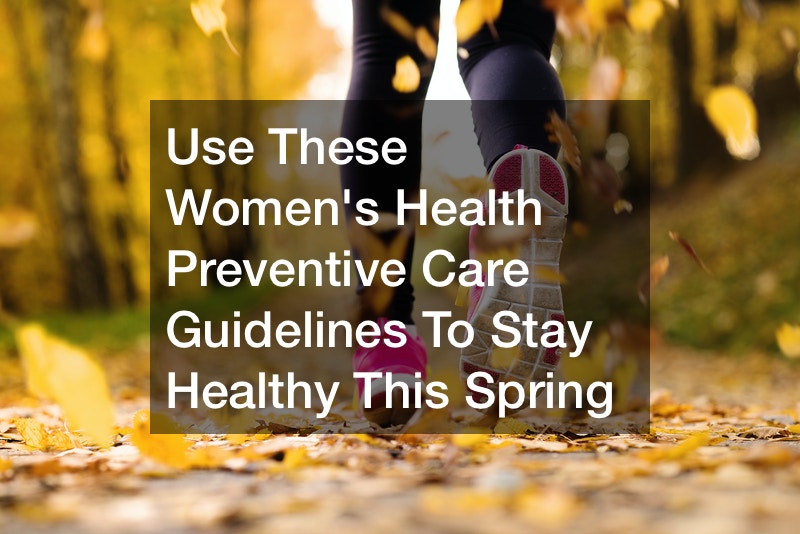
Women need to be more proactive in health maintenance due to the complexities of their anatomy. There are issues like childbirth and menopause, among other conditions, that they have to be accountable for. The good news is that most women are proactive with preventive health visits. These health visits to medical professionals provide them insight into habits that can be changed to maximize their wellbeing. Below are a few women’s health preventive care guidelines that women should adhere to.
Well-Woman Visit
This visit is an opportunity for a woman to get advice on maintaining a healthy lifestyle to minimize health risks. Women also get a chance to ask questions on issues like infertility, abnormal periods, or any other gynecology issues. It’s an opportunity for the woman to address any concerns they have regarding their wellbeing. During this visit, expect the physician to address your history. That involves aspects like your symptoms, medical and family history, medications, and allergies. Note that family history is used as a tool for assessing risk. For example, if there is a history of cancer in your family, you will be referred to genetic testing, and you may want to consider your health and life insurance options, like cancer insurance. Well-woman checkups follow women’s health preventive care guidelines by screening for diseases, addressing lifestyle habits, and keeping vaccinations up-to-date.
Bone Health Screenings
A bone mineral density (BMD) check indicates whether you have osteoporosis, a condition where your bones get weak and thin. The test measures whether you have calcium in your bones, among other types of minerals. It is a quick and painless process by using an x-ray. If your mineral content is low, it means you have weaker bones that are likely to break. Women’s health preventive care guidelines recommend older women, at around the age of 65, get this test. If your posture has gotten more hunched or you are experiencing pain at the joints, consider going for this test. BMD screening help identifies any issues early so that you can start treatment. You should also get a bone screening if you start experiencing pain in the knees or back. A doctor offers stem cell therapy among back and knee pain solution. This method uses regeneration therapy to heal injuries and reduce pain one may be experiencing.

Mammogram
A mammogram is an x-ray picture of the breast. This screening tool is used to detect breast cancer in women who show no signs of the disease. Screening helps detect breast cancer easily, which increases your chances of survival. There is no specific time on when one should start having regular mammograms. However, women’s health preventive care guidelines recommend every one to two years for women from the age of 40. Consult with your healthcare provider on the risks and benefits involved before making a decision.
Gestation Diabetes Screening
Pregnant women are at risk of getting this condition during pregnancy resulting in serious health risks for both the unborn child and the woman. Gestation diabetes increases the chances of complications during pregnancy and labor. Pregnant women between the 24th and 28th weeks of pregnancy need to visit an ob/GYN for screening.
Hormone Replacement Therapy (HRT)
HRT is commonly used to treat symptoms of menopause like vaginal discomfort, mood swings, night sweats, reduced sex drive, and hot flashes. However, if you have a history of ovarian cancer, breast cancer, or womb cancer, hormone replacement treatment is not suitable. Similarly, if you have a history of blood clots and liver disease or untreated high blood pressure, find an alternative treatment form.

Pregnancy Care
Once you discover you are pregnant, make an appointment with an obstetrician who will also take care of you throughout your pregnancy. You will also need to reschedule prenatal checkups and test to ensure that you and the baby are healthy.
Breastfeeding Support and Counseling
It is common for women to experience difficulties in breastfeeding after giving birth. They might therefore need support, to feed their babies successfully. In such cases, they will be referred to nurse practitioners who can provide practical solutions and educate them on overcoming challenges in breastfeeding.
Contraception
Among women’s health preventive care guidelines that women should note is the use of birth control. Contraceptives prevent pregnancy till you are ready to be a parent. It also helps you determine how many children you want to have and when you want them. There are many forms of birth control in the market, especially for women. So despite the stage, you are in your life, you need to make an informed choice on what is the ideal method for you. You may also have to consult with an ob/GYN on the available choices.

Blood Pressure Screening
From the age of 18, women should have their blood pressure checked every two years. Unsafe blood pressure levels strain the heart and blood vessels, resulting in conditions like a heart attack, heart failure, kidney failure, or stroke. A normal reading should be pressure below 120/80 mm Hg and above 90/60 mm Hg. If you get anything outside that range, get medical care. A blood pressure screening is the only way to identify hypertension.
Cholesterol Screening
From the age of 20, the risk of women getting coronary heart disease is high. For women with consistent cholesterol levels, a screening every five years is recommended. However, should there be a significant change in lifestyle like massive weight gain, the screening should be done often. Flagging any abnormal cholesterol levels can help reduce the risk of getting heart disease.
Lung Cancer Screening
Adults around the age of 55-80 with a history of smoking should undergo lung cancer screening. The same applies to those who have quit within the past 15 years. Screening helps detect early signs of lung cancer.

Eye Exam
Among important women’s health preventive care guidelines, an eye exam is also necessary. For women between the ages of 20-29, one eye exam is recommended, and at least two exams for women between the ages of 30-39. For older women, it should be done often. A regular eye exam can help detect a vision disorder or age-related conditions.
Hearing Test
A hearing test should be done anytime you start experiencing hearing problems. The physician will ask questions like when you started noticing problems with hearing and whether it was gradual or sudden. They will also want to know if you have had an injury or infection that has caused the hearing issue. A hearing test ensures that your ears are working properly, and if not, offer a solution like a hearing aid.
Dental Exam and Cleaning
A visit to the dentist should be scheduled every once or twice a year. General dentistry involves managing your overall oral health care needs such as fillings, root canals, and gum care. During the dental cleaning, the dentist will remove plaque or bacteria that can lead to gum or tooth disease. They will also check for mouth cancer. Any issues with your teeth can be a symptom of osteoporosis.
Skin Exams
Skin exams help detect abnormal changes on your skin or suspicious moles and growth. The doctor will observe the shape, color, size, or other suspicious growth to diagnose your condition. A skin exam also helps detect skin cancer early.
Pap Test and HPV Testing
In the U.S, the Human Papillomavirus is a common sexually transmitted virus. Most women’s health preventive care guidelines insist that a pap test is done every three years for women between ages 21-29. For women aged 30-65, both a Pap and HPV test should be done every 5 years and a pap test alone, every three years. These tests help detect any abnormalities which can indicate the early stages of cervical cancer or women at risk of developing cervical cancer.
Chlamydia and Gonorrhea Test
For any sexually active woman up to the age of 25, consider having this test done yearly. For older women, if you are at an increased risk of infection, like having multiple partners, then have the test done often. A Chlamydia test can help you get into treatment early and also reduce the risk of spreading it.
HIV and Sexually Transmitted Infection Tests
Any sexually active woman needs to get tested alongside their partner before they start any sexual activity. For pregnant women, the test should be done at the beginning of pregnancy and occasionally during the 9 months, depending on their risk. Women’s health preventive care guidelines insist on such tests to prevent the spread of HIV and STDs. It also helps in taking preventive measures to avoid birthing a child that is infected.
Domestic and Interfamily Violence Screening and Counseling
Any woman can be the victim of different forms of violence, either by their spouse or a family member. Some health care providers have been trained in identifying signs of abuse in a victim. To prevent further instances of abuse, women’s health nurse practitioners offer counseling.
Mental Health Screening
Mental health is as important as physical health. A mental health screen will help find if you have any mental disorders like anxiety, depression, bipolar, and eating disorders, among others. Some signs that you may need mental health screening include excessive worrying, fatigue and lack of energy, and extreme sadness. Once your primary healthcare provider makes a diagnosis, they will refer you to the proper doctors like psychologists or licensed clinical social workers.
The above women’s health preventive care guidelines are meant to help women catch any condition they may have early and treat it. However, there are a few lifestyle choices that women can practice to ensure they live longer and happier. They include:
- Research: Women need to research information on how they can do to prevent certain diseases by a change of lifestyle.
- Take care of your bones: You need to include foods rich in calcium in your diet or get calcium supplements from your healthcare provider.
- Reduce alcohol intake and avoid illicit drugs: Excessive consumption of alcohol and the use of drugs can have some severe effects on both your health and social life.
- Be mindful of the medicine you take: Follow instructions carefully for any medicine you are taking. When a healthcare provider or pharmacist recommends any other medication, inform them of the ones you are taking in case of the possibility of a bad reaction.
- Practice hygiene: Ensure that you are practicing both personal and general hygiene. That includes body cleanliness, brushing your teeth, and wearing clean clothes. Ensure your house is clean and well maintained. A dirty house can be a breeding ground for pests which can lead to diseases. In case there are pests like rats, call pest control service. Exterminating rats will help prevent diseases. If there are any repairs to be made in the house like a crack or roof repair, call a contractor to fix it, as pests may use them to get inside your house.
- Practice Safety: You can easily avoid accidents by wearing a seatbelt or a bike helmet. Install smoke and carbon monoxide detectors in the house. While out in the sun, wear sunscreen and sunglasses to protect your skin and eyes. Use protection if you are sexually active or with multiple partners or birth control if you are not ready to be a parent.
- Have regular checkups: This includes preventive exams and self-exams.
- Avoid smoking: Smoking causes a lot of preventable diseases.
- Eat Healthily: Be mindful of what you eat. Include fruits and vegetables in your diet in plenty. Ensure you have a balanced diet but eat in moderation.
- Exercise: A simple 30 mins exercise every day goes a long way in promoting your general physical and mental health.
- Rest: Rest is also critical. You need to take a break from work and do something for yourself. Do things you enjoy like your hobbies or catch up with friends and family.
Preventive care visits for women should start from adolescence and continue throughout their lifespan. These visits are meant to ensure that their health is okay. Additionally, it helps catch any condition when it is in the early stages, ensuring early treatment and increasing survival chances.




